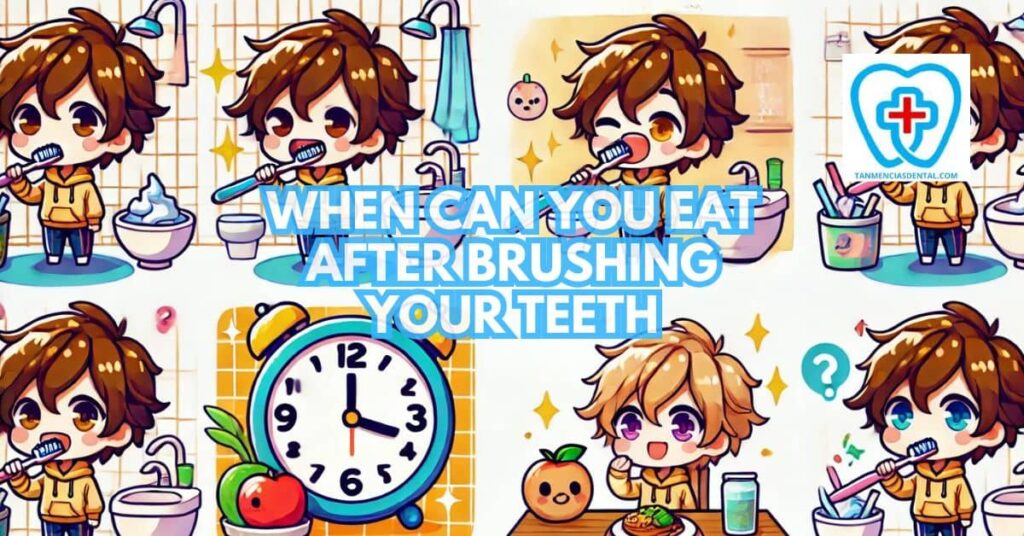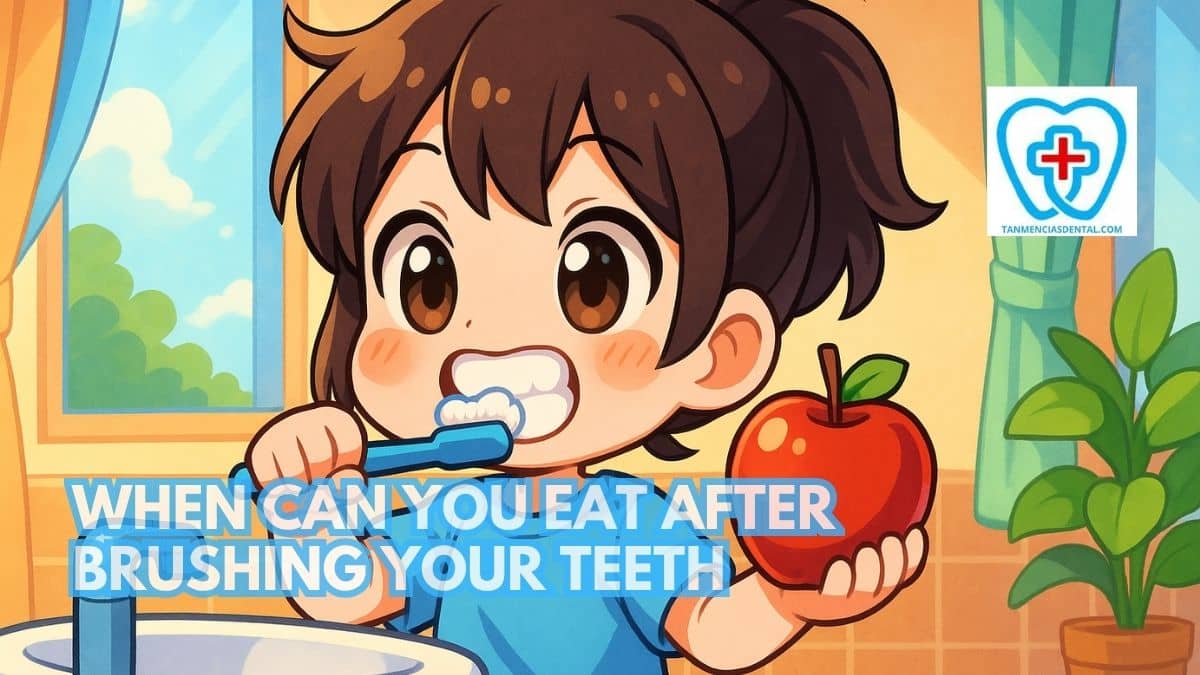Knowing when can you eat after brushing your teeth is important for keeping your mouth healthy.
Brushing cleans your teeth and adds fluoride, which helps protect your enamel.
Eating right after brushing can wash away fluoride and make your teeth weaker.
Acidic and sugary foods eaten too soon can also harm your enamel.
Waiting before eating gives fluoride time to work and keeps your teeth strong.
1. Brushing Before or After Breakfast: The Morning Routine
Deciding whether to brush your teeth before or after breakfast can significantly impact your oral hygiene routine.
Brushing your teeth before breakfast ensures they are clean to start the day, removing overnight bacteria and plaque that have accumulated while you sleep.
However, brushing after breakfast can help remove food particles and reduce the risk of plaque buildup from your meal.
If you choose to brush after eating, it’s important to wait to eat after brushing for at least 30 minutes to avoid damaging your enamel, which can be softened by acidic foods and drinks.
Understanding how long you should wait before eating or drinking after brushing is crucial for protecting your teeth.
Both options have their benefits, so consider your diet and morning routine to decide what works best for you.
Whether you prefer brushing before or after breakfast, the key is to ensure you are maintaining a consistent and effective oral hygiene routine.
🦷 How to Find the Best Dental Implants in Marikina Clinics and Specialists
2. The Ideal Waiting Time After Brushing
The ideal waiting time after brushing your teeth before eating is about 30 minutes.
This waiting period allows the fluoride in your toothpaste to strengthen your enamel effectively.
Eating too soon after brushing can interfere with this process, reducing the benefits of fluoride.
Additionally, waiting helps protect your teeth from immediate exposure to acids and sugars in foods, which can be particularly harmful when your enamel is softened from brushing.
By giving it time, you ensure that your teeth receive the full protective benefits of fluoride.
🦷 Can You Catch Gingivitis? Brushing Up on Contagious Gum Disease
3. The Power of Fluoride in Toothpaste
Fluoride in toothpaste plays a vital role in reinforcing tooth enamel and preventing cavities.
It works by remineralizing the enamel, making it more resistant to acid attacks from food and bacteria.
To maximize these benefits, it is important to allow fluoride sufficient time to act on your teeth before eating.
But how long should you wait?
Experts recommend waiting at least 30 minutes after brushing before consuming any food or drink.
This waiting period ensures that the protective layer created by fluoride has time to fully develop.
People need to wait this long because eating or drinking too soon can wash away the fluoride, reducing its effectiveness.
By allowing the fluoride to properly protect your teeth, you help keep them strong and reduce the risk of tooth decay.
🦷 Flossing for the Win: Best Floss for Gingivitis and Healthy Gums
4. What to Drink After Brushing: Stick to Water
After brushing your teeth, the best drink to consume is water.
Water does not interfere with the protective fluoride layer on your teeth.
Unlike other beverages, it doesn’t contain acids or sugars that can erode enamel or promote decay.
Drinking water also helps rinse away any remaining toothpaste residue, keeping your mouth clean.
In addition, staying hydrated with water supports overall oral health by maintaining saliva production, which naturally protects your teeth and gums.
🦷 How Much Does It Cost for a Dental Checkup?

5. How Saliva Protects Your Teeth After Brushing
Saliva plays an important role in keeping your mouth healthy after you brush your teeth.
It helps wash away leftover food and reduces acids that can harm your teeth.
Saliva also carries minerals that help rebuild and strengthen your tooth enamel.
When you eat or drink, saliva works to balance the pH in your mouth to prevent damage.
Staying hydrated supports saliva production, which is essential for protecting your teeth after brushing.
🦷 How Long Should You Brush Your Teeth With Braces?
6. Beware of Acidic Drinks and Foods After Brushing
Avoid consuming acidic drinks and foods immediately after brushing your teeth.
Acids from citrus fruits, juices, and sodas can weaken your enamel, which is particularly vulnerable right after brushing.
When your enamel is softened, it’s more prone to erosion and decay from these acidic substances.
To protect your teeth, wait at least 30 minutes before consuming such items.
This allows your enamel to re-harden and reduces the risk of damage.
Brushing your teeth twice a day helps remove the bacteria in your mouth, but eating acidic foods too soon afterward can undo this benefit.
Being mindful of what you eat and drink after brushing helps maintain strong, healthy teeth in the long term.
🦷 How a Timer for Brushing Your Teeth Can Make You a Brushing Master
7. Sensitive Teeth? Wait a Little Longer
If you have sensitive teeth, it’s wise to wait even longer than the standard 30 minutes before eating after brushing.
Sensitive teeth benefit from prolonged fluoride exposure, which can help strengthen enamel and reduce discomfort.
Extending the wait time to about an hour can offer additional protection, ensuring that your teeth are less reactive to hot, cold, or sweet foods.
This extra time allows the fluoride to thoroughly fortify your enamel, minimizing sensitivity issues.
Following this practice can lead to a more comfortable and healthier oral environment.
🦷 How To Make Brushing Teeth Fun For Toddlers
8. Brushing Before Bed: A Must for Oral Hygiene
Brushing your teeth before bed is a crucial part of maintaining good oral hygiene.
This routine removes the day’s accumulated plaque, bacteria, and food particles.
Going to bed with a clean mouth helps prevent the development of cavities and gum disease.
After brushing, wait at least 30 minutes before consuming anything to allow the fluoride to effectively protect your teeth overnight.
This habit ensures your teeth are clean and well-protected as you sleep, reducing the risk of overnight bacterial growth.
🦷 Why Are Tooth Doctors Important for Your Family’s Dental Care?
9. Morning Brushing Options: Brushing After Breakfast
Brushing your teeth after breakfast can be a beneficial routine for removing food particles and reducing plaque buildup from your meal.
However, it is important to wait at least 30 minutes after eating before brushing to avoid damaging your enamel, which can be softened by acidic foods and drinks.
This waiting period allows your enamel to re-harden and reduces the risk of erosion.
By brushing after breakfast, you ensure your teeth are clean and free from the remnants of your meal, which helps maintain oral health throughout the day.
This practice can be particularly effective if your breakfast includes sugary or starchy foods.
🦷 What are The Best Products for Gingivitis That Actually Work
10. Consult Your Dentist for Personalized Advice
Each person’s oral health needs can vary, so it is important to consult your dentist for personalized advice.
Your dentist can provide specific guidelines based on your dental health, lifestyle, and any existing conditions.
They can recommend the best brushing and eating routines to optimize your oral hygiene.
Regular dental checkups allow your dentist to monitor your oral health and adjust their advice as needed.
Following your dentist’s recommendations helps ensure that your oral care routine is effective and tailored to your individual needs.
🦷 Can Toddlers Use Electric Toothbrushes?
11. When to Eat After Using Whitening Products
If you use whitening toothpaste or strips, it is advisable to wait even longer before eating.
Whitening products can make your teeth more porous temporarily, increasing their susceptibility to staining and damage from acidic or pigmented foods.
Waiting at least an hour after using these products allows your teeth to re-harden and reduces the risk of reversing the whitening effects.
During this time, it is best to avoid foods and drinks that can stain, such as coffee, tea, and red wine.
This extra caution helps maintain the results of your whitening treatment and protects your teeth.
🦷 Top-Rated Family Dentist in Marikina
👨⚕️ Conclusion
Understanding when you can eat after brushing your teeth helps you maintain better oral health.
By waiting at least 30 minutes, you allow the fluoride in your toothpaste to effectively strengthen and protect your enamel.
Avoiding acidic and sugary foods and drinks right after brushing further reduces the risk of enamel erosion and decay.
Consulting your dentist for personalized advice ensures that your oral care routine meets your specific needs.
By following these guidelines, you can keep your teeth healthy and strong, ensuring a bright smile for years to come.
😊 Self-Promotion
Visit Tan-Mencias Dental Clinic in Parang, Marikina City, for top-quality dental care in a friendly and welcoming environment.
Our dedicated team is here to ensure your smile is healthy and bright.
You can easily reach us with any questions or concerns by calling 9171451074, sending a message through our Facebook page, or using our website’s contact form.
We’re committed to providing personalized and compassionate care for all your dental needs.
Come experience the difference at Tan-Mencias Dental Clinic, where your smile is our priority!

